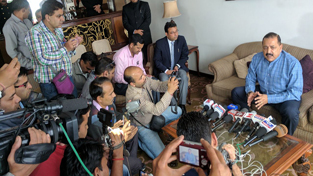
Excelsior Correspondent
NAINITAL, July 9: Union Minister of State (Independent Charge) for Development of North Eastern Region (DoNER), MoS PMO, Personnel, Public Grievances, Pensions, Atomic Energy and Space, Dr Jitendra Singh said here today that GST has a special significance for Jammu & Kashmir and the eight States of Northeast and in certain respects, J&K may benefit even more than the North-Eastern States. The same also applies to States like Uttarakhand and Himachal Pradesh, he said.
Briefing the media before leaving for union capital after the conclusion of the two-day conference on Governance,Dr Jitendra Singh said, GST promises to provide a level-playing field to all the States of the Indian union. This equitable fair deal has been worked out to such an extent that several of the developed and manufacturing States will be contributing to the economy of the lesser developed or predominantly consumer States, he said.
During the process of GST rollout, Dr Jitendra Singh said, he realized that there were certain local products in Northeast which had apparently become taxable after GST implementation, though these were tax-free before GST roll-out. However, he said, it was explained to the local household traders that earlier the price of these products also included certain embedded taxes on raw material, etc. which were not visible, but now the only difference was that GST was a visible tax, although the final cost of the product would almost be the same. In case of J&K, however, he added, there were hardly such instances and to that extent, it was more of a win-win bargain.
In addition to the economic empowerment of these peripheral States, Dr Jitendra Singh said, the single decision of GST implementation has made a huge long-lasting impact of value addition to the self-esteem and participation of these States in the economic and social growth of India as a whole. He gave full credit to the Union Finance Minister Arun Jaitley for working out an amicable formula wherein the manufacturing States would be compensated from the Central share of funds and thus, would not have the chance to hold any grudge against non-manufacturing States being brought at par with them.
Dr Jitendra Singh said that those who still hold certain reservations against GST implementation will soon come to regret their stand because in the global world of today, no single country or State can hope to operate in isolation and yet progress economically.

